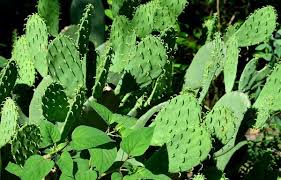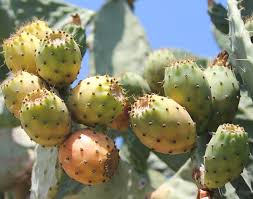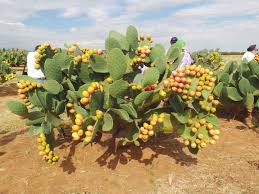![]()
If you’ve landed on this article page, you’re probably searching for a
good business idea—an idea that’s light on the pocket but heavy on
returns, promising both a fulfilling journey and potential profit.
|
How to start Cactus Farming in Nigeria
Cactus farming is not too common or popular. But it can be a
good business for making profits, and commercial cultivation of
cactus is gaining popularity gradually. Because, it’s very easy
and simple to start and operate a cactus farming business.
Opuntia is a genus in the cactus family, Cactaceae. The cactus
is also known by many other different names in different parts
of the world. It’s most common name is prickly pear. But it is
also known by some other names such as opuntia, tuna fruit,
sabra, mopal, paddle, paddle cactus etc.
What are the ideal environmental conditions for cacti to grow in
Nigeria?
Cacti are succulent plants that are well-known for their ability
to thrive in harsh environmental conditions. In Nigeria, where
the climate can be hot and dry, cacti can be a great addition to
your garden or indoor space. However, to ensure the best growth
and health of your cacti, it is essential to provide them with
the ideal environmental conditions.
Here are some factors to consider when creating the ideal
environment for cacti in Nigeria:
Temperature: Cacti are native to desert regions, and they thrive
in hot and dry conditions. Most cacti prefer temperatures
between 70°F (21°C) and 90°F (32°C) during the day and slightly
cooler temperatures at night. Therefore, it is crucial to choose
a location with plenty of sunlight and warmth for your cacti to
grow.
Light: Cacti require bright, indirect sunlight to promote
healthy growth. Place your cacti in a spot where they can
receive at least six to eight hours of sunlight every day. In
Nigeria, it is essential to protect your cacti from direct
sunlight during the hottest part of the day, as intense heat can
cause sunburn on their delicate skin.
Soil: Choosing the right soil mixture is vital for the
successful growth of cacti. In Nigeria, where the soil can be
clayey or sandy, it's essential to improve the drainage of the
soil by adding sand or pumice. A suitable soil mix for cacti
consists of equal parts of coarse sand, perlite, and
well-draining potting soil. This mixture allows excess water to
drain away quickly, preventing root rot.
Watering: Cacti are adapted to survive in arid environments, so
they have unique water requirements. In Nigeria's dry climate,
it is crucial to water your cacti infrequently but deeply. Water
your cacti when the top inch of soil feels dry to the touch, and
make sure to water the soil, avoiding the cactus itself to
prevent rot. During the rainy season, it is advised to bring
your cacti indoors or provide them with shelter to protect them
from excessive rainfall.
Humidity: Cacti are accustomed to low humidity levels, so they
do well in Nigeria's drier regions. However, if you live in a
more humid area, you can still grow cacti successfully. To
reduce humidity levels around your cacti, you can use a fan or
air conditioner to improve air circulation. Additionally, avoid
overwatering your cacti, as stagnant water can increase humidity
levels around the plant.
Fertilization: While cacti require minimal fertilization,
providing them with a balanced fertilizer during their active
growth period can promote healthier growth and flowering. Use a
diluted, low-nitrogen fertilizer specifically formulated for
cacti and succulents once a month from spring to early fall.
During the winter months, it is best to refrain from fertilizing
as most cacti enter a dormant period.
Pest control: Cacti are generally resilient against pests, but
they can still be susceptible to mealybugs, scale insects, and
spider mites. Regularly inspect your cacti for any signs of
infestation, such as white, cotton-like webs or tiny brown
scales. If you notice any pests, you can remove them manually
using a cotton swab dipped in rubbing alcohol. In severe cases,
you may need to use an insecticidal soap or consult a
professional.
Creating the ideal environmental conditions for cacti in Nigeria
involves providing them with ample sunlight, well-draining soil,
infrequent but deep watering, and protection from excessive
humidity and rainfall. By following these guidelines, you can
enjoy the beauty and resilience of cacti in your Nigerian garden
or indoor space.
Another succulent commonly found in Nigeria is the Aloe vera
plant. Aloe vera is known for its medicinal properties and is
often cultivated for its gel-filled leaves. Like cacti, Aloe
vera plants are drought-tolerant and can survive in arid
conditions. They are also known for their spiky leaves and can
be mistaken for cacti from a distance.
While these succulents can be found in Nigeria, it is important
to note that they are not native to the country. They have been
introduced and cultivated in gardens and landscapes for their
aesthetic appeal or practical uses. Native plant species in
Nigeria are more diverse and adapted to the country's specific
climate and ecosystem.
In order to understand how cacti can thrive in different
climates, it's important to first understand their unique
characteristics. Cacti are succulent plants, which means they
have the ability to store water in their stems, leaves, and
roots. This allows them to survive in dry and arid environments
where water is scarce. However, cacti also have the ability to
thrive in tropical climates that receive heavy rainfall.
When growing cacti in Nigeria, it's important to provide them
with adequate sunlight, as they thrive in bright, sunny
conditions. Cacti should be placed in areas of the garden that
receive at least six to eight hours of direct sunlight each day.
In arid climates, cacti may require some protection from intense
afternoon sun, as excessive heat can damage their delicate
tissues.
Cacti can indeed thrive in both arid and tropical climates,
including the different regions of Nigeria. With the right care
and attention, cacti can be a stunning addition to any garden or
landscape, adding a unique touch of greenery and beauty. Whether
you live in a dry, arid region or a tropical rainforest, cacti
can bring a touch of the desert to your surroundings and thrive
in the diverse Nigerian climate.
Choose the right variety: Select cactus varieties that are known
to thrive in hot and dry environments. Research the specific
needs of each variety to ensure they are compatible with
Nigeria's climate.
Provide well-draining soil: Cacti prefer sandy or rocky soil
that drains well. Amend the soil with sand or small pebbles to
improve drainage and prevent root rot.
Water sparingly: Cacti are adapted to survive in dry conditions,
so they do not require frequent watering. Only water when the
soil is completely dry, and be sure to soak the soil thoroughly
and allow it to dry out between waterings.
Protect from extreme temperatures: While cacti can tolerate high
temperatures, they can be susceptible to damage if exposed to
extreme heat or frost. Provide some shade during the hottest
part of the day and bring potted cacti indoors during cold
snaps.
Fertilize sparingly: Cacti have low nutrient requirements and
can be easily burned by excessive fertilizer. Use a balanced
cactus fertilizer diluted to half strength and apply it
sparingly during the growing season.
Monitor for pests: Cacti are generally low-maintenance plants,
but they can be susceptible to pests such as mealybugs and
scale. Regularly inspect your plants for signs of infestation
and take appropriate measures to control pests if necessary.
By following these steps and selecting cactus varieties suited
to Nigeria's climate, you can enjoy a beautiful and thriving
cactus garden. Whether you choose the prickly pear, mottled
spurge, or snake plant, cacti can add a unique and
drought-tolerant touch to your garden or indoor space.
Gets our Practical Guide on Cactus Farming. This comprehensive
guide will walk you through the fundamentals of starting and
running a successful Cactus Farming Business in Nigeria, from
initial planning to profitability. We’ll cover key factors like
identifying in-demand niches, establishing a strong brand,
marketing effectively, optimizing operations and delivering an
exceptional student experience.
|







